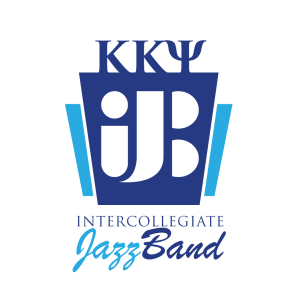
Program Overview:
The Kappa Kappa Psi Intercollegiate Jazz Band is a premier ensemble that celebrates the vibrant spirit of jazz while showcasing the talents of collegiate musicians from across the nation. Formed as an extension of Kappa Kappa Psi’s commitment to musical excellence and leadership in collegiate bands, this inaugural jazz band provides a dynamic platform for young artists to collaborate, innovate, and perform. Under the direction of esteemed jazz educators and directors, the ensemble brings together diverse musical voices and showcases a repertoire that spans the spectrum of jazz styles, from traditional swing to contemporary jazz fusion. Through this initiative, Kappa Kappa Psi continues to elevate and inspire the next generation of jazz musicians, creating unforgettable performances and fostering a deep appreciation for America’s original art form.
Rehearsal & Performance Dates:
Rehearsal: Monday, July 14 – Wednesday, July 16
Performance: 7:30 PM Wednesday, July 16 at the Lexington Opera House
Inaugural Kappa Kappa Psi Intercollegiate Jazz Band Conductor: Jarrard Harris
 A native of Louisville, Kentucky, saxophonist and educator Jarrard Harris attended the Youth Performing Arts School in high school and attended the University of Cincinnati College Conservatory of Music to further his jazz studies. At CCM he studied with Rick VanMatre, Pat Harbison, and Marc Fields. Upon Graduation from CCM Harris moved to Chicago in 1998 to further his studies at DePaul University where under the tutelage of Bob Lark, Tim Coffman, and Marc Colby he earned his master’s degree in jazz studies. Harris currently lives in Chicago, where he is on the jazz faculty of Northwestern University, Columbia College Chicago and the City Colleges of Chicago. He also serves as the director of jazz studies with the Chicago Public Schools Advanced Arts Education Program at Gallery 37. He maintains an active private teaching studio in addition to adjudicating and performing at college and high school festivals, giving master classes, and lecturing, he has performed with musicians in the United States and abroad. Jarrard was a founding board member of the Jazz education Network and serves as a current board member for the Jazz Institute of Chicago.
A native of Louisville, Kentucky, saxophonist and educator Jarrard Harris attended the Youth Performing Arts School in high school and attended the University of Cincinnati College Conservatory of Music to further his jazz studies. At CCM he studied with Rick VanMatre, Pat Harbison, and Marc Fields. Upon Graduation from CCM Harris moved to Chicago in 1998 to further his studies at DePaul University where under the tutelage of Bob Lark, Tim Coffman, and Marc Colby he earned his master’s degree in jazz studies. Harris currently lives in Chicago, where he is on the jazz faculty of Northwestern University, Columbia College Chicago and the City Colleges of Chicago. He also serves as the director of jazz studies with the Chicago Public Schools Advanced Arts Education Program at Gallery 37. He maintains an active private teaching studio in addition to adjudicating and performing at college and high school festivals, giving master classes, and lecturing, he has performed with musicians in the United States and abroad. Jarrard was a founding board member of the Jazz education Network and serves as a current board member for the Jazz Institute of Chicago.
Audition Information and Requirements: Auditions Open November 8th, 2024 | Auditions Close April 15, 2025
Welcome to the audition process for the Inaugural Kappa Kappa Psi Intercollegiate Jazz Band! We’re excited to invite talented undergraduate and graduate collegiate musicians to showcase their skills and passion for jazz music. As a member of this prestigious ensemble, you’ll be expected to demonstrate strong technical proficiency, stylistic versatility, and improvisational creativity.
Audition Requirements and Expectations:
- Accompaniment Tracks: All instrumentalists (excluding drumset players) must perform with accompaniment tracks, such as those from Jamey Aebersold’s jazz play-along series. This allows us to assess your ability to interact with rhythm and harmony in a “live ensemble context.”
- Memory Requirement: All tunes and improvisations should be performed from memory.
Recording Expectations:
- Please use a high-resolution device (i.e., cellular phone, computer/laptop, iPad/tablet). The recording does not have to be professionally made; however, we recommend that you ensure the recording is of high quality and without technical problems.
-
- EACH video component must be done in one continuous, unedited take. If you need to merge each unedited component into one video, please do so with editing software- many are free.
- Your face, fingers, valves, keys, or slides must always be visible in the video.
- Upload your complete video to a File Sharing service such as Google Drive, Dropbox, or YouTube. If using Google Drive or Dropbox, please enable your video link-sharing settings so anyone with the link can view it. If using YouTube, please select the unlisted video option, not private.
- Save/Rename Video Title as: 2025 KKPsiIJB Audition_First Last Name (i.e., 2025 KKPsiIJBAudition_Skylar Seaton
- Provide a short introduction of yourself (hello/first and last name)
General Requirements for All Instruments (excluding Drumset)
- Scales: Demonstrate proficiency in the following scales (Choose one for each):
- Major
- Whole Tone
- Diminished (both half-whole and whole-half)
- Ascending Melodic Minor
- Tune Selection and Improvisation: Choose one tune from each of the following lists. Perform the melody and improvise over the chord changes from memory:
- Bebop Tunes: Groovin’ High, Half Nelson, Confirmation, Donna Lee, Joy Spring, Stablemates
- Standard Tunes: All The Things You Are, Stella By Starlight, What Is This Thing Called Love?, Star Eyes, Alone Together, There Will Never Be Another You, Have You Met Miss Jones?, On Green Dolphin Street
- Post-Bop Tunes: Giant Steps, Moment’s Notice, Bolivia, Inner Urge, Dolphin Dance, Moontrane
- Jazz Étude or Transcription: Prepare and perform a jazz étude or a transcription of a solo by a renowned jazz artist. This piece should highlight your technical and musical abilities, as well as your understanding of jazz language and phrasing.
Instrument-Specific Requirements
Jazz Bass (Acoustic Preferred)
- Walking Bass Lines: Demonstrate a walking bass line over a 12-bar blues progression in Bb or F. This should showcase your knowledge of chord changes, rhythmic consistency, and swing feel.
- Tune Performance: Perform the melody and improvise over chord changes from each of the three lists above, displaying your grasp of jazz harmony and phrasing.
- Accompaniment Skills: Play a 4-bar pattern that outlines chords and root movement in various styles (swing, bossa nova, samba).
Guitar
- Comping Skills: Demonstrate comping over a 12-bar blues in Bb or F, showcasing rhythmic variety, chord voicings, and dynamic control.
- Tune Performance: Perform the melody and improvise on the chord changes from each of the tune categories above, with an emphasis on chord-tone targeting and smooth voice-leading.
- Soloing: In addition to improvising, display chord-melody playing for the standard tune selection to show harmonic understanding.
Piano
- Comping Patterns: Accompany a 12-bar blues progression in F or Bb, with focus on voicings and rhythmic style. Include both swing and Latin feels.
- Tune Performance: Perform melody and improvise over each of the three tunes, demonstrating your ability to balance melody and harmonic support.
- Soloing Skills: Provide a two-handed approach for the post-bop tune selection, illustrating your coordination and harmonic fluency.
Saxophone
- Improvisation and Melody: Perform a jazz standard from each list, including the melody and improvised solo. Use articulation and phrasing to bring out the character of each tune.
- Extended Techniques: Demonstrate altissimo register and double-time phrases for added style. (Can be demonstrated in solos)
Trumpet
- Range and Endurance: Demonstrate your range by playing a chromatic scale up to your highest note, and include dynamics for control.
- Tune Performance: Play the melody and improvise on each tune category. Showcase agility, lyrical playing, and phrasing in your solos.
- Articulations and Style: Include typical jazz articulations such as half-valving, growling, and bending pitches to show stylistic depth.
Trombone
- Range and Flexibility: Be prepared to demonstrate your highest comfortable note in a major scale.
- Tune Performance: Perform and improvise on tunes from each of the three lists with attention to expressiveness, use of vibrato, and stylistic details.
- Articulations: Show proficiency with various jazz articulations (e.g., scoops, falls, glissandos) in improvised sections.
Drumset
- Styles Demonstration: Play a range of styles to show versatility and control:
- 4/4 Swing at various tempos, from ballad to up-tempo.
- Funk and Rock grooves with solid timing and dynamic control.
- Latin Styles: Perform both Samba and Bossa Nova rhythms.
- Mambo and Afro-Cuban 6/8 grooves, displaying understanding of clave and syncopation.
- Brushwork: Play a 12-bar blues with brushes, focusing on smooth articulation, dynamic control, and rhythmic creativity.
Mallet Auxiliary Percussion (i.e. Vibes)
- Comping Patterns: Accompany a 12-bar blues progression in F or Bb, with focus on voicings and rhythmic style. Include both swing and Latin feels.
- Tune Performance: Perform melody and improvise over each of the three tunes, demonstrating your ability to balance melody and harmonic support.
We look forward to hearing each applicant’s unique style and dedication to the jazz tradition. Bring your passion and energy to the audition — good luck to all!

